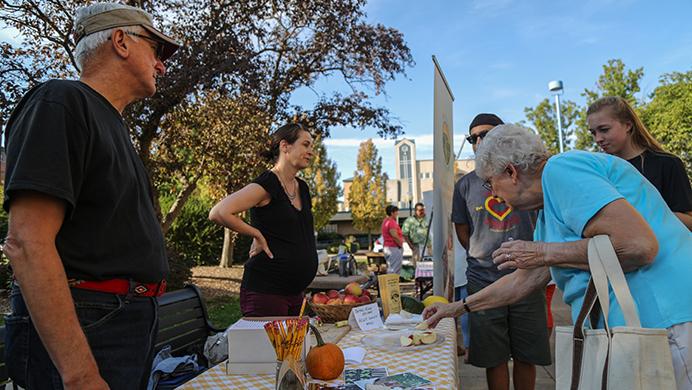Last week, the Iowa City City Council announced that as a part of an ongoing sustainability effort, this year’s Farmers’ Market will no longer have vendors providing non-reusable plastic bags. The market, to support the effort, has purchased 1,500 reusable bags to be handed out for free on a first-come, first-serve basis with more bags available for purchase at $3 a piece.
This step, though modest, is an important one for Iowa City and a tremendous test drive for future changes. The Daily Iowan Editorial Board considers this a great step in the right direction for a more sustainable community, state, and country. However, it is but a small part of the changes needed to combat the disastrous federal legislation and proposed budgeting.
In the latest budget proposal by the Trump administration, the Environmental Protection Agency would experience a $2.1 billion cut (31 percent) in its 2018 budget. More than a lack of funding, this is a way for the Trump administration to effectively say, “We do not believe in climate change or the potential catastrophic implications of its effects, both financially and physically.”
In the face of a federal government that refuses to act on climate change, the duty must fall on local and state governments. The removal of single-use plastic bags from the Farmers’ Market needs to lead to future measures by Iowa City and the state of Iowa.
Several other state and local governments are making changes like Iowa City, but in even broader measures. For example, according to the Star Tribune, the entire city of Minneapolis (with few exceptions) will ban all plastic bag use beginning June 1. The Minneapolis City Council will impose a 5-cent charge to customers hoping to use plastic bags or, alternatively, businesses that wish to continue their bag use without charging customers can contribute money to a litter cleanup fund. This is with the goal of Minneapolis ultimately becoming a zero-waste city.
Elsewhere, the state of Washington’s proposed carbon tax (a tax on energy from coal, oil, and gas) failed in November with only 42 percent of the vote. However, 42 percent of the voting population in Washington voting for this measure is another tremendous stride forward and frankly represents an incredible turn in the trajectory of climate-change legislation.
Many pundits believe that a carbon tax is a satisfactory compromise that could be the route to solving many climate-change issues. Even several conservatives, including former Secretary of State James Baker III, approve of the idea because it maintains small government while allowing a free market to determine the effect of climate change by increasing the price of the environment-harming resources.
Both the state government in Washington and the city government in Minneapolis have admitted that such taxes and bans will be — to some extent — burdensome, but in the end, these measures will prove beneficial to the overall success and health of the city and state.
The new plastic-bag rule for the Iowa City Farmers’ Market sets in motion a path for the city to take part in individual, local, and state government initiatives that can counteract President Trump’s detrimental policies. The DI Editorial Board implores City Council to keep the ball rolling with further measures.



